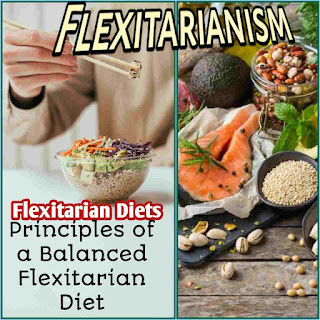Decoding Flexitarian Nutrition: Your Comprehensive Guide to a Healthy 2024 Diet
 |
| Nutrition Flexitarianism. Healthy diet |
-Nutrition Flexitarianism. Healthy diet 2024
-Is the flexitarian diet healthy?
-Which foods are allowed on a flexitarian diet?
-What is flexitarian diet meal plan?
-What is the 80 20 flexitarian diet?
Table of Contents:
1. Introduction
- Flextarianism: A Modern Approach to Diet
2. Understanding Flexitarian Diets
- Meat Consumers, Avoiders, and Reducers
- The Rise of Flexitarian Diets (FDs)
- Semi-Vegetarianism (SVDs)
- Balancing Nutrition and Ethics
- Health Concerns and Recent Findings
3. Principles of a Balanced Flexitarian Diet
- Plant-Centric Eating
- Plant-Based Protein Focus
- Flexibility in Meat Consumption
- Whole and Unprocessed Foods
- Sugar and Sweets Moderation
4. Exploring the Health Benefits of the Flexitarian Diet
- Flexibility for a Healthier Lifestyle
- Potential Health Benefits
- Learnings from Vegan and Vegetarian Diets
- Emphasis on Plant-Based Foods
Read Gas & Bloating:Causes and Prevention
Exploring Flextarianism: A Flexible Approach to Diet
Introduction:
"Flextarianism" is a modern term gaining popularity in science and daily life. Coined in 2014, it combines "flexible" and "vegetarian." A flexitarian mostly follows a vegetarian diet but occasionally includes meat or fish. Despite high meat demands globally, more people are adopting flexitarian habits, choosing to consume meat less regularly.
Flexitarian Diet: Balancing Plants and Meat in Your Plate
A flexitarian or semi-vegetarian diet is mostly plant-based with occasional meat or fish. Recently, more people are leaning towards this approach. Let's explore the health perspective and the flexibility of the Flexitarian Diet, encouraging a balance between plant-based and animal products in moderation.
The Flexitarian Diet: Finding Balance with Plant-Based and Animal Foods
Created by dietitian Dawn Jackson Blatner, the Flexitarian Diet combines vegetarian benefits with the flexibility to include animal products moderately. Unlike strict vegetarians or vegans, flexitarians find a balance by incorporating animal foods without fully eliminating them.
Understanding Flexitarian Diets: A Balanced Approach to Eating
1. Meat Consumers, Avoiders, and Reducers:
- Consumers generally fall into these three categories.
2. The Rise of Flexitarian Diets (FDs):
- Reflects a trend toward being "meat-reducers."
- Involves eating meat occasionally, not daily.
3. Semi-Vegetarianism (SVDs):
- SVDs significantly reduce meat intake on at least 3 days a week.
- Often used interchangeably with flexitarian diets.
4. Balancing Nutrition and Ethics:
- Recognizes meat as a crucial source of protein, fat, and micronutrients.
- Considers ethical aspects, like avoiding intensification and improving animal welfare.
5. Health Concerns:
- Acknowledges evidence linking excessive red and processed meat consumption to health risks.
- Highlights associations with mortality, cardiovascular disease, type 2 diabetes, and certain cancers.
6. Recent Findings:
- International Agency for Research on Cancer classifies red meat as probably carcinogenic.
- Processed meat is classified as carcinogenic to humans.
Principles of a Balanced Flexitarian Diet
1. Plant-Centric Eating:
- Emphasize fruits, vegetables, legumes, and whole grains.
2. Plant-Based Protein Focus:
- Prioritize plant-based protein over animal sources.
3. Flexibility in Meat Consumption:
- Be adaptable, integrating meat and animal products occasionally.
4. Whole and Unprocessed Foods:
- Opt for the least processed, most natural forms of foods.
5. Sugar and Sweets Moderation:
- Limit intake of added sugar and sweets for a healthier diet.
Exploring the Health Benefits of the Flexitarian Diet
1. Flexibility for a Healthier Lifestyle:
- The Flexitarian Diet's adaptable approach attracts those aiming for a healthier lifestyle.
2. Potential Health Benefits:
- Research suggests potential health advantages of a flexitarian diet.
- Challenges arise due to the lack of a clear definition for assessment.
3. Learnings from Vegan and Vegetarian Diets:
- Insights from vegan and vegetarian diet research inform potential benefits of the Flexitarian Diet.
- Though not clearly defined, similarities allow for some extrapolation.
4. Emphasis on Plant-Based Foods:
- To harness health benefits, prioritize fruits, vegetables, legumes, whole grains, and minimally processed foods.
Also Check:




0 Comments